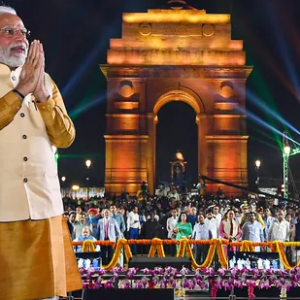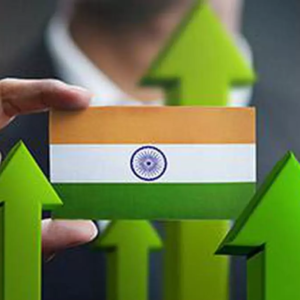~ By Ram Madhav
We are living in a world which is increasingly turning democratic. Since the end of the Cold War, an unprecedented number of countries have chosen democracy as their preferred form of government.
It is a matter of pride that in our immediate neighbourhood two new democracies have taken birth in the last one decade. Royal Kingdom of Bhutan has turned into Democratic Republic of Bhutan in 2008 with the active support of the Prince himself who has taken upon himself the new role of constitutional monarch.
Last year the much awaited eventuality has finally happened in Myanmar.
After five decades of military rule, the opposition, Nobel Peace Laureate Aung San Suu Kyi’s National League for Democracy (NLD), won a landslide victory in elections that most observers declared free and relatively fair. More than 80 percent of registered voters cast their vote which is more than 32 million people. Myanmar’s democracy has taken birth. This achievement is significant because it was preceded by a peaceful struggle of five decades.
Yet it is also a fact – rather a saddening one – that some 2.6 bn people – more than one-third of the world’s population – still live under authoritarian and non-democratic regimes. It is even more saddening because a good number of those authoritarian regimes exist in our region. They pose the first major challenge to democracy.
Democracy is a result of people’s constant endeavour for liberty and fight against tyranny in whatever form. “Liberty led to democracy and not the other way around”, says Fareed Zakaria in his book ‘The Future of Freedom’.
When India secured independence after a long struggle for liberty it opted for democracy as the form of government. Mahatma Gandhi, leader of India’s freedom struggle, justified the decision saying:“Democracy was something that would give the weak the same chance as the strong”.
Democracy no doubt has many positives. A study of Albright Foundation concludes that:
- Democratic states are less likely to breed terrorists or to be state sponsors of terrorism
- Democratic states are less likely to go to war with one another or to create or tolerate humanitarian crises that produce refugee flows and demands for international action
- Democratic states are also more likely to be active participants in the global economy
But as someone commented ‘democracy is the second best available form of governance’. It is not completely flawless. Then what is the best one? Yet to be invented.
Democracy is at one level the rule by the majority; at another level it is rule of law. Singapore has been ruled by the People’s Action Party since independence, and under the leadership of Lee Kuan Yew between 1959 and 1990. Singapore model is described as a “consencracy“.
Mankind’s urge for more liberty and more freedom continues. It poses major challenges to democracies all over the world. Democracy brings in absolute political equality through One Man – One Vote system. But will it suffice? What about social and economic inequalities. One of the founding figures of India’s Constitution Dr. B.R. Ambedkar warned in 1950: “On the 26th of January 1950, we are going to enter into a life of contradictions. In politics we will have equality and in social and economic life we will have inequality. In politics we will be recognizing the principle of one man one vote and one vote one value. In our social and economic life, we shall, by reason of our social and economic structure, continue to deny the principle of one man one value. How long shall we continue to live this life of contradictions? How long shall we continue to deny equality in our social and economic life? If we continue to deny it for long, we will do so only by putting our political democracy in peril. We must remove this contradiction at the earliest possible moment or else those who suffer from inequality will blow up the structure of political democracy which is Assembly has to laboriously built up.”
Historically this urge for more liberty has led to evolution of democracy into a better form of governance. But the urge continues. The second challenge thus is to manage that urge for more liberty – social, economic – in a manner that would lead to better democracy. If we fail in that it will result in anarchy.
In this context the biggest threat comes from the Left-Liberal discourse. The danger of this group hijacking the liberty discourse and leading it in the direction of destruction of democratic institutions and values is not imaginary; it is real. We in India witness it on a daily basis.
Left-Liberal discourse is essentially anarchist. Yet they camouflage their agenda in a language that is deceptive. In leading the communists to power Mao incorporated the word ‘democracy’ into party-speak to gain popular support. But what Mao actually meant in 1949 became clear when he declared that China would be ruled by a ‘people’s democratic dictatorship’. Mao’s was one of the bloodiest dictators in the world.
Liberalism and freedom are the slogans that are being used today to destroy existing democratic and state institutions. The poor and the socially disadvantaged sections are becoming the tools in this destructive agenda. Democracies become mobocracies in the process.
The Conservatives sometimes tend to swing their pendulum too much in the direction of free markets and capitalism. Fighting poverty, inequality and discrimination should also be the priority of the Conservatives. That is the second major challenge for democracies.
Columnist and author Fareed Zakaria coined the phrase – ‘Liberal Constitutionalism’ to find a meeting ground between liberty and freedom on one side and democracy and constitutionalism on the other. It is important in the interest of protecting our democratic values and institutions to be more open and accommodative to the urgings of greater liberty and freedom.
Democracies face an inherent challenge of authoritarianism by virtue of being politics based on numerical superiority. The urge to get greater numbers in order to have greater control over the government is natural. But we should strive for a government system that is less pervasive and non-intrusive. Eminent Indian political thinker and philosopher Kautilya had warned in his treatise Arthashastra against laws and punishments which are excessive as these make the king lose popular support.
In India Prime Minister Modi follows the dictum ‘Minimum Government – Maximum Governance’. In the last 24 months the Indian government has repealed more than 1100 laws that have become archaic and obsolete.
Of late, demographics is posing a new challenge to democracies. This problem is not new in our region. India has a major illegal migrant population from neighboring Bangladesh. But the present situation in Europe is making the larger world understand the challenges posed by such migrations. They effect demographics of the region leading to affecting socio-economic indicators adversely. Migrants and their refusal to integrate with the local cultural and democratic institutions and ethos pose a major challenge to democracies.
Terrorism – religious or otherwise – too is a challenge that many countries in the region face today. It is no longer any local problem. No country can claim immunity from it; nor can any community. India has been a victim of terror for last several decades. Romanticising terror using cliches like ‘One man’s terrorist is another man’s freedom fighter’ is the danger the open democratic societies face. This line of argument positions violence and terror as an alternative to democracy and constitutionalism. We need to ruthlessly curb this menace unitedly.
Democracies face certain internal challenges too, like Dynastic Politics, Communal Politics, Caste and class based Politics etc.
Maintaining democracy, even for countries with long-standing democratic traditions, requires education, sustained vigilance, and active support of the masses. An Israeli philosopher had described democracy as an arrangement in which ‘Institutions don’t humiliate individuals and individuals don’t humiliate each other’.
Together we must move in that direction for our democracies to flourish.
[The article is the gist of author’s address at the International Democratic Union executive in Colombo on 25th February, 2016. It appeared in India Foundation Journal, January-April 2016 issue.]


